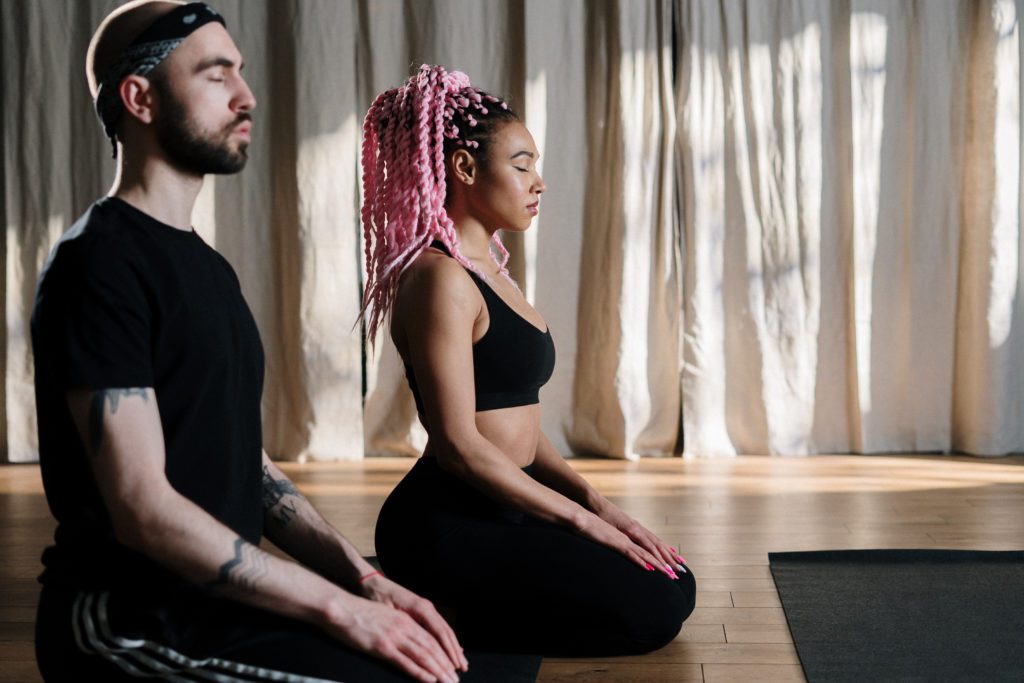Did you know that May is Mental Health Awareness month?
In the midst of the coronavirus pandemic, it’s more relevant than ever that we focus on maintaining mental health. In fact, it’s essential.
Major depression is one of the most common mental disorders in the United States. And it’s only gotten more elevated in this time of uncertainty.
Fortunately, practicing yoga for depression can help to alleviate symptoms and provide a sense of well-being.
How Practicing Yoga for Depression Helps

Researchers are utilizing a wide array of randomized controlled trials to look at the relationship between yoga and depression. Using these specific trials is the best way to verify study results.
What these studies have found so far is that yoga can reduce the impact of stress, improve energy, and serve as a self-soothing technique similar to meditation, relaxation, and exercise. All of these help to ease the symptoms of depression and anxiety.
Studies Reinforce Findings
Beyond the trials, regular studies into the benefits of yoga for depression are coming up with similar results. There is plenty of research that’s made a correlation between multi-week yoga programs and significantly lower scores on depression screening questionnaires.
But it goes beyond simply asking participants in studies how they’re feeling. In one very promising study, researchers assigned 15 people with major depressive disorder to a yoga curriculum that has a strong focus on alignment, safety, and precise modifications.
Each week, the participants took two 90-minutes classes and completed three 30-minute home yoga practices. They were also given specific breathing assignments to do each week. After 12 weeks, brain imaging techniques and mood measures showed that their depressive symptoms improved to match those of people who didn’t have depression.
How Could This Be?
The study was the first to show that specific yoga postures and deep breathing can increase Gamma aminobutyric acid (GABA) – a naturally occurring amino acid that works as a neurotransmitter in your brain.
“Yoga … is not just hippie, granola-crunchy stuff,” says Dr. Chris Streeter, an associate professor of psychiatry and neurology at Boston University School of Medicine. “The science shows it works,”
Streeter notes the importance of having a regular practice though in order to build a mechanism of relaxation and resiliency. “Yoga students can activate this mechanism appropriately when under stress and go back to being relaxed,” he adds.
Learning Awareness through Yoga
Science has only recently studied the positive impact of yoga. But the practice has been around for 5,000 years, so it’s hard to deny that there’s something to it.

Part of what makes yoga uniquely qualified to address depression is that it has all of the benefits of physical exercise, but also incorporates an emotional and spiritual aspect. In addition, the breath work learned on the mat enables you to alleviate your symptoms in stressful situations off the mat. It becomes second nature.
One of the biggest benefits of yoga is its ability to teach awareness. This is an especially valuable skill if you struggle with depression.
Most Americans begin to cultivate awareness through their yoga practice by first practicing poses. But the instruction and motivation provided by the instructor also give a busy mind something on which to focus. And this keeps you grounded in the moment.
When your depression is rooted in worries about the future or resentments about the past, keeping the mind in the present moment is a powerful tool. It allows you to shift your attention from your worries, fears, and symptoms onto something more concrete. Focusing on a specific pose, breathing exercise, or mantra is settling.
The Power of the Present Moment
In this more settled state, it’s easier to recognize subtle shifts occurring in the body. As you become more aware of these changes, it’s increasingly easier to notice subtle alterations in the mind and mood too. You’ll feel how the mind and body are connected in a tangible way.
To put it more succinctly, you start noticing what’s going on in your mind as you’re doing each pose. You could be beating yourself up with harsh inner dialogue. On the flip side, maybe you’re needlessly proud. It could be that you’re just wanting an escape.
Whatever the case, as you continue to fine tune the moment-to-moment awareness of your body, thought, emotions, and breath in your yoga practice on the mat, you’ll bring that awareness to your daily life off the mat.
There’s tremendous value in paying attention. It puts you in touch with your thoughts and feelings so that you can begin to resolve the more problematic ones. Then you can address those issues in the moment – rather than waiting for them to come to surface later in a much more painful way.
This is the magic of yoga.

Could Yoga Help You Manage Your Depression?
It goes without saying that these are challenging times. And even though many studios are closed, you can still practice yoga for depression in your home.
Many facilities are live-streaming and there is a wealth of practices on YouTube. So check them out.
Then when life starts returning to normal, you may want to consider mobile yoga for your workplace, school, or organization to keep the flow going.
Contact us today to find out how to get started.



